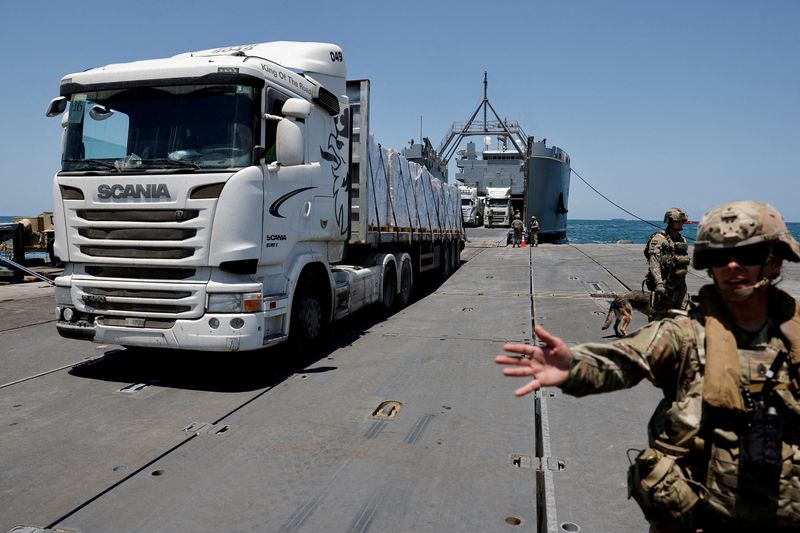Factbox-How much has U.S.-built Gaza aid pier helped get aid into Gaza?
2024.07.11 04:59
(Reuters) – A U.S.-built pier designed to increase flows of humanitarian aid into the Gaza Strip has been beset by challenges and is now expected to be permanently dismantled.
U.S. officials have said they will attempt to reinstall the pier to clear a backlog of Gaza-bound aid in Cyprus, and that it is then likely to be permanently dismantled.
Aid workers and others have long questioned the project, saying delivering aid by land is the only effective way to get supplies at scale into Gaza, where Israeli forces are fighting a war against the Palestinian Islamist militant group Hamas.
Here are some details on the pier.
WHY WAS THE PIER BUILT?
U.S. President Joe Biden announced a plan to put the pier in place in March, following warnings that famine could spread across Gaza and increasing difficulties sending aid through land crossings, most of which were kept shut by Israel for months.
Biden made the announcement as he sought to cool anger among many in his Democratic Party over support for Israel during its offensive in Gaza, given the heavy toll on civilians.
During the war – which began after Hamas-led gunmen attacked Israel on Oct. 7 last year, triggering Israel’s military retaliation – humanitarian conditions have deteriorated rapidly for Gaza’s 2.3 million residents. Almost all its residents have been displaced within the coastal enclave, many of them multiple times.
HOW IS THE PIER OPERATED?
The about 1,200-foot-long (370-metre-long) floating pier is located offshore a little north of the Wadi Gaza coastal wetland. Construction of the pier, which was partially pre-assembled in the Israeli port of Ashdod, started in April. Aid first began arriving on May 17.
Food and other aid supplies have been transported to the pier from Cyprus, which spearheaded efforts to open a sea route for humanitarian assistance.
Supplies have been X-rayed in Cyprus in the presence of Israeli officials, who have closely monitored aid entering Gaza, saying it could benefit Hamas.
Aid has then been transported to the pier by ship before being loaded onto trucks to be driven onto the coast.
The operation is complex, involving about 1,000 U.S. military personnel, some stationed on the pier. The Pentagon estimated that the first 90 days of operation would cost about $230 million.
WHAT PROBLEMS HAS THE PIER FACED?
The pier has been temporarily removed several times because of rough seas. On one occasion it was towed to the southern Israeli port city of Ashdod for repairs after a section broke off.
Shipments have also been held up by delays in distributing supplies into Gaza, a process that is fraught with risk and requires Israeli approvals.
When considering whether to bring back the pier after bad weather in late June, U.S. officials said there would be little point in doing so immediately because the marshalling area next to the pier was nearly full.
As has been the case with aid delivered on other routes, supplies coming off the pier have sometimes been seized by desperate Gazans or subject to more organised looting.
The U.N. World Food Programme, tasked with overseeing distribution of aid from the pier, paused operations in June because of security concerns.
Some aid workers expressed concern that a pier operated by the U.S. military could put humanitarian staff and operations at risk because locals might question their neutrality or see them as undercover agents.
In June, the Pentagon sought to dispel what it said were false social media reports that Israel used a floating U.S. pier off Gaza in a hostage rescue mission.
HOW MUCH AID HAS BEEN DELIVERED
As of June 25, almost 7,000 metric tons of assistance had arrived in Gaza via Cyprus, U.S. aid officials said, roughly the equivalent of 350 aid trucks.
Aid officials say about 600 trucks of humanitarian and commercial supplies are needed in Gaza daily to meet the needs of the population.
Before Israel expanded its military operation in the southern Gazan city of Rafah in early May, most aid had been arriving in Gaza via the Rafah crossing with Egypt, or through the nearby Israeli-controlled crossing of Kerem Shalom. In April, an average of 189 trucks entered daily through the Rafah and Kerem Shalom crossings, according to U.N. data.
Several countries have also delivered aid through air drops, but these carry as little as a few tonnes of aid, much less than a truckload, and can put civilians on the ground at risk.
States should not hide behind airdrops and a maritime corridor “to create the illusion that they are doing enough to support the needs in Gaza”, a group of 25 NGOs said in a statement in March.
WHAT’S THE PIER’S FUTURE?

The pier was authorised to remain in operation up to July 31. A senior U.S. official had said in June that it could be extended by at least another month.
Pentagon officials have cautioned that the sea could become too rough for the pier after the summer.








